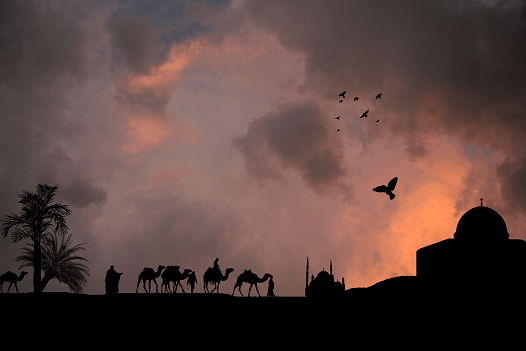حَدَّثَنَا أَحْمَدُ بْنُ عَبْدِ اللَّهِ بْنِ يُونُسَ، حَدَّثَنَا زُهَيْرٌ، حَدَّثَنَا أَبُو الزُّبَيْرِ، عَنْ جَابِرٍ، قَالَ اقْتَتَلَ غُلاَمَانِ غُلاَمٌ مِنَ الْمُهَاجِرِينَ وَغُلاَمٌ مِنَ الأَنْصَارِ فَنَادَى الْمُهَاجِرُ أَوِ الْمُهَاجِرُونَ يَا لَلْمُهَاجِرِينَ . وَنَادَى الأَنْصَارِيُّ يَا لَلأَنْصَارِ . فَخَرَجَ رَسُولُ اللَّهِ صلى الله عليه وسلم فَقَالَ ” مَا هَذَا دَعْوَى أَهْلِ الْجَاهِلِيَّةِ ” . قَالُوا لاَ يَا رَسُولَ اللَّهِ إِلاَّ أَنَّ غُلاَمَيْنِ اقْتَتَلاَ فَكَسَعَ أَحَدُهُمَا الآخَرَ قَالَ ” فَلاَ بَأْسَ وَلْيَنْصُرِ الرَّجُلُ أَخَاهُ ظَالِمًا أَوْ مَظْلُومًا إِنْ كَانَ ظَالِمًا فَلْيَنْهَهُ فَإِنَّهُ لَهُ نَصْرٌ وَإِنْ كَانَ مَظْلُومًا فَلْيَنْصُرْهُ ” .
Jabir b. Abdullah reported that two young men, one from the Muhajirin (emigrants) and the other one from the Angr (helpers) fell into dispute and the Muhajir called his fellow Muhajirin, and the Ansari (the helper) called the Ansar (for help). In the meanwhile, Allah’s Messenger (ﷺ) came there and said: What is this, the proclamation of the days of jahiliya (ignorance)? They said: Allah’s Messenger, there is nothing serious. The two young men fell into dispute and the one struck at the back of the other. Thereupon he (the Holy Prophet) said: Well, a person should help his brother whether he is an oppressor or an oppressed. If he is the oppressor, he should prevent him from doing it, for that is his help; and if he is the oppressed, he should be helped (against oppression). Sahih Muslim 2584
When Muhammad (SAW) was twenty years old, a battle broke out at the Fair of ‘Okaz in the month of Dhul Qa‘dah. The warring tribes were the Quraysh and Kinana on one side and the Qays Ghilan on the other. The fighting was fierce, and several people on both sides were killed.
At last, they made peace on condition that whichever side had suffered the most casualties would get blood money (recompense for unlawful killing). This battle was the fourth and most deadly in a series of skirmishes that had erupted each of the previous three years. It would, however, be the last. It came to be known as the Battle of Fijar (Arabic for immorality) as it took place in a sacred month when fighting was prohibited and violated the sanctity of a sacred month with bloodshed.
As a member of the Quraysh, Muhammad (SAW) was also present in the battle. His role was to collect the enemy’s arrows and hand them over to his uncles.
In the wake of the Battle of Fijar, when peace was restored, people felt the need for forming confederacy at Makkah for suppressing violence, injustice, and vindicating the rights of the weak and the destitute. Later that month a covenant was agreed upon among the five tribes of the Quraysh in the home of an elderly man called Abdullah bin Jada’an At-Taimy. It was known as Hilf Al-Fudool and its signatories were Banu Hashim, Banu Abdul Muttalib, Banu Asad, Banu Zahra, and Banu Taym.
This covenant was born in response to a shameful denial of justice to a stranger. A man came from Zabid to sell his merchandise in Makkah. A local resident by the name of Aas bin Wayel took all of the stranger’s goods but refused to pay for them. The helpless stranger approached the people of Banu Abdul Dar, Banu Makhzoom, Banu Jamah, Banu Sahm and Banu Ady, all of whom ignored his cry for redress. In desperation, he climbed atop a hill called Jabal Abu Qays and informed everyone of how all his goods had been stolen. Then he implored his listeners to come forward to help him. His plea was answered by Zubayr bin Abdul Muttalib, who volunteered to help the unfortunate stranger.
Zubayr called on representatives of all the clans to assemble in the house of Abdullah bin Jad’an of Banu Taym. At this assembly, the tribal leaders agreed that henceforth they would stand up for anyone who had suffered injustice, regardless of his tribal affiliation. They then forced Aas bin Wayel to return the merchandise he had taken.
Muhammad was also present with his uncles during the institution of the covenant, which he regarded as an honorable pact.
After Allah swt had made Muhammad (saw) a Prophet, he declared: “I was present when a covenant was agreed upon in the house of Abdullah bin Jad‘an, and I would not accept even a red camel in lieu of it. Had I been asked to uphold it even in the days of Islam, I would have agreed.”
The spirit of this confederacy and the course of deliberations marked a complete departure from the pre-Islamic tribal pride.
(The Sealed Nectar by Safiur-Rahman Mubarakpuri, pages 61-62.)
(When the Moon Split by Safiur-Rahman Al-Mubarakpuri, pages 26-28)
